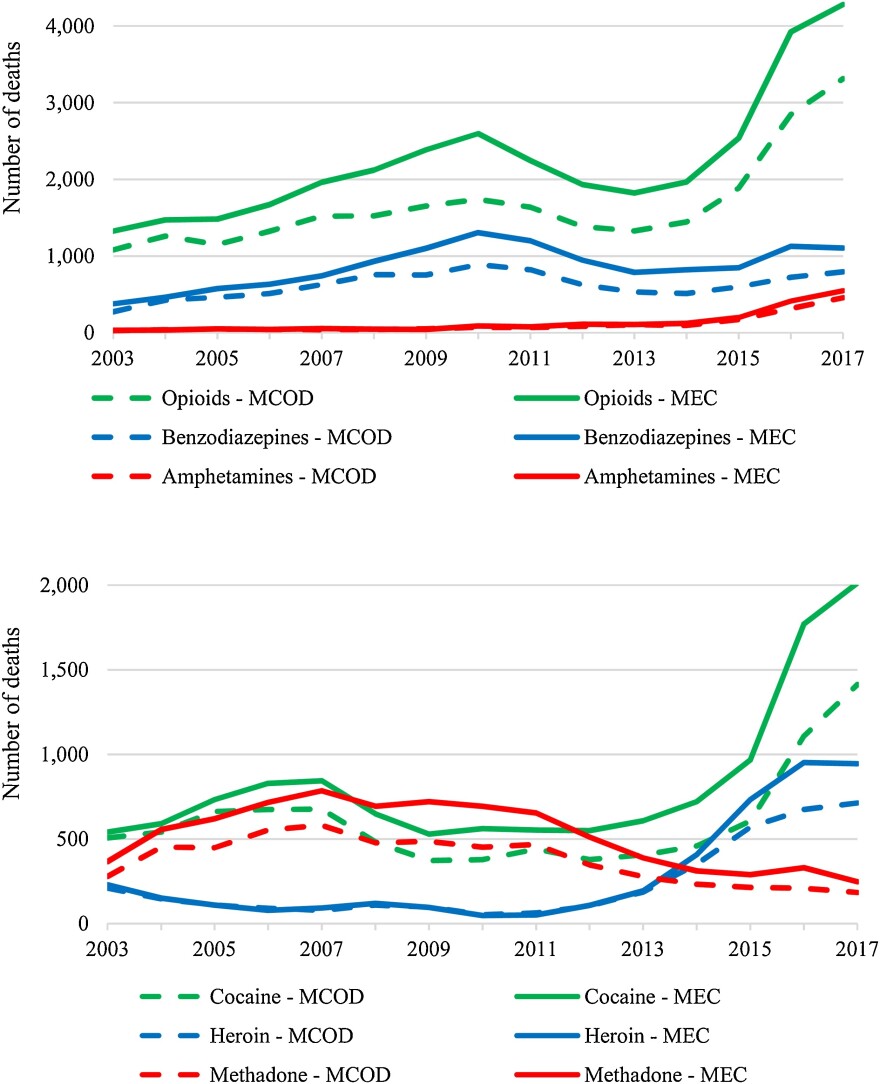A new study from the University of South Florida shows federal data on fatal overdose rates underestimates which drugs caused the deaths.
The study looked at data from the Centers for Disease Control and Prevention’s Multiple Cause of Death (MCOD) database and data from the Florida Medical Examiners Commission (FMEC) between 2003-2017.
While state and federal data about the total number of overdoses was consistent, the CDC underreported the specific drugs that caused those deaths. For example, about one-in-three deaths caused by opioids during that period were not reported by the federal government.
Study author Troy Quast, associate professor of health economics at USF’s College of Public Health, explained the disparity has to do with death certificates.
The CDC bases its data on death certificates submitted by local authorities. These certificates have space for authorities to list the cause of death and there’s additional information they can provide where they can list the specific drugs that caused the death, but that doesn’t always happen.
“So for drug overdose deaths, the death certificate will say ‘drug overdose,’ but it may not always indicate the specific drug which caused the overdose,” said Quast.
“This is a function of many issues,” he went on. “It could be strained resources, you know toxicology tests take a long time, coroners’ offices are backlogged, largely because of the drug epidemic, and so a lot of those death certificates aren’t completed with the most complete information.”
Quast estimates about 25% of death certificates submitted to the CDC nationally are missing information about the specific drug that caused the death. He said it varies by state and year, but said Florida usually falls within that average rate.
Medical examiners in Florida, on the other hand, are required by the state to wait for complete toxicology results before submitting an official cause of death to the Florida Medical Examiners Commission.
It often takes weeks or even months to identify the exact drug or drugs that caused an overdose, and Florida medical examiners must fill out a form listing every drug that was present at the time of death before state data is considered complete.

The study found disparities between state and federal data for a variety of drugs.
“I think cocaine is one that jumped out at me,” Quast said. “With cocaine, especially towards the end of the time period, roughly one quarter of the cocaine deaths that were reported in the Florida data were not reported in the CDC data.”
He said similar figures for heroin were also striking.
“Whereas the state and federal data were pretty close until 2013 or so, from that point forward the state data reported much larger numbers of (heroin-related) deaths than the CDC data,” he said.
Quast speculates the rise of fentanyl in recent years could have played a role in why the difference in reporting heroin as a cause of death grew toward the end of the time period.
"With the emergency opioid epidemic and the problems it’s caused throughout the state and throughout the country I think having better data on heroin could be especially helpful,” he said.
Ultimately Quast said the disparities are concerning because federal data is often used by policymakers, researchers and others involved with combatting drug crises when trying to secure resources and raise awareness.
“The CDC data is pretty much the standard that everyone uses,” he said. “With the CDC data perhaps being undercounted, it could indicate that some resources are not being directed as maybe we’d want. You know, there might be some drugs for which the epidemic is emerging, there might be trends in the data that are not being observed because we don’t have this complete data set.”
RELATED: Read more of WUSF's coverage of the opioid crisis
Quast acknowledged there are several limitations to his study including different ways in which the MCOD and FMEC define location of death and demographics. He also said toxicology tests vary, and it can be difficult to determine which specific drug caused a death depending on how many drugs were present at the time and how the test results are interpreted.
Still, the CDC is aware that its data may not reflect the true scope of the problem for specific drugs and is working to help states improve the way they collect data. While Florida is considered average in that about 75% of death certificates it submits to the CDC include information about which drug caused a fatal overdose, Quast said some other states only submitted 60% or so with that information.
Quast cited the CDC’s Enhanced State Opioid Overdose Surveillance program as an example of one of the ways the federal government is devoting more resources to this issue. The program recently awarded $13 million to help state medical examiners conduct comprehensive toxicology reports more quickly.
He said while Floridians are fortunate to at least have a policy in place that requires state data include what drugs were involved in an overdose death, more can be done to help medical examiners get that information faster.
“I think that the medical examiners are in dire need of increased funding,” said Quast. “They are facing these backlogs (of toxicology tests and autopsies) with no end in sight. Even in Florida with this strong policy in place our death certificates are not complete and those drugs are not being specified all the time. So I think that does indicate there is a need for increased funding and increased assistance to medical examiners to try to address this backlog.”




